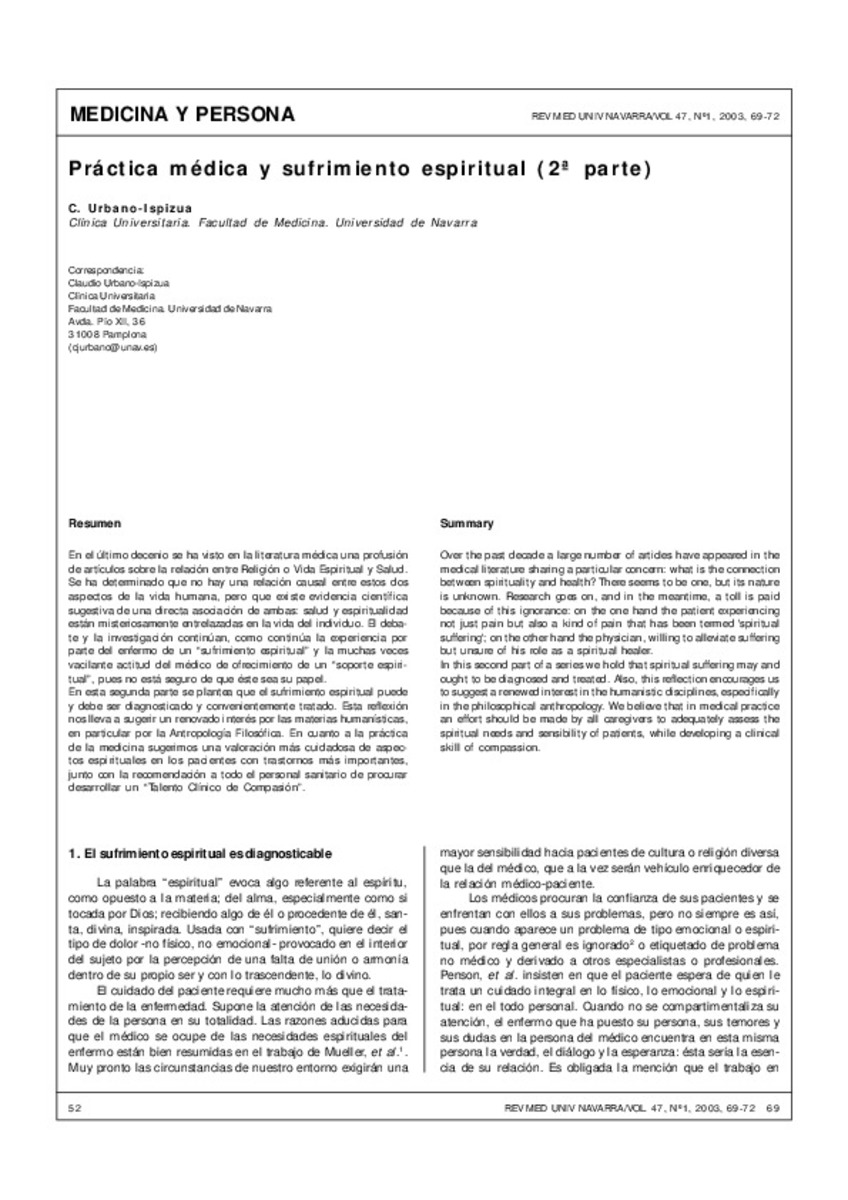Full metadata record
| DC Field | Value | Language |
|---|---|---|
| dc.creator | Urbano-Ispizua, C. (Claudio) | - |
| dc.date.accessioned | 2016-01-11T11:21:25Z | - |
| dc.date.available | 2016-01-11T11:21:25Z | - |
| dc.date.issued | 2003 | - |
| dc.identifier.citation | Urbano-Ispizua, C. (C.). “Práctica médica y sufrimiento espiritual (2a parte)”. REV MED UNIV NAVARRA/VOL. 47, No1, 2003, 69-72. | es_ES |
| dc.identifier.issn | 0556-6177 | - |
| dc.identifier.uri | https://hdl.handle.net/10171/39687 | - |
| dc.description.abstract | En el último decenio se ha visto en la literatura médica una profusión de artículos sobre la relación entre Religión o Vida Espiritual y Salud. Se ha determinado que no hay una relación causal entre estos dos aspectos de la vida humana, pero que existe evidencia científica sugestiva de una directa asociación de ambas: salud y espiritualidad están misteriosamente entrelazadas en la vida del individuo. El debate y la investigación continúan, como continúa la experiencia por parte del enfermo de un “sufrimiento espiritual” y la muchas veces vacilante actitud del médico de ofrecimiento de un “soporte espiritual”, pues no está seguro de que éste sea su papel. En esta segunda parte se plantea que el sufrimiento espiritual puede y debe ser diagnosticado y convenientemente tratado. Esta reflexión nos lleva a sugerir un renovado interés por las materias humanísticas, en particular por la Antropología Filosófica. En cuanto a la práctica de la medicina sugerimos una valoración más cuidadosa de aspec- tos espirituales en los pacientes con trastornos más importantes, junto con la recomendación a todo el personal sanitario de procurar desarrollar un “Talento Clínico de Compasión”. | es_ES |
| dc.description.abstract | Over the past decade a large number of articles have appeared in the medical literature sharing a particular concern: what is the connection between spirituality and health? There seems to be one, but its nature is unknown. Research goes on, and in the meantime, a toll is paid because of this ignorance: on the one hand the patient experiencing not just pain but also a kind of pain that has been termed 'spiritual suffering'; on the other hand the physician, willing to alleviate suffering but unsure of his role as a spiritual healer. In this second part of a series we hold that spiritual suffering may and ought to be diagnosed and treated. Also, this reflection encourages us to suggest a renewed interest in the humanistic disciplines, especifically in the philosophical anthropology. We believe that in medical practice an effort should be made by all caregivers to adequately assess the spiritual needs and sensibility of patients, while developing a clinical skill of compassion. | es_ES |
| dc.language.iso | spa | es_ES |
| dc.publisher | Servicio de Publicaciones de la Universidad de Navarra | es_ES |
| dc.rights | info:eu-repo/semantics/openAccess | es_ES |
| dc.subject | Materias Investigacion::Ciencias de la Salud | es_ES |
| dc.subject | Sufrimiento espiritual | es_ES |
| dc.subject | Diagnostico | es_ES |
| dc.subject | Crisis Existenciales | es_ES |
| dc.subject | Talento Clínico | es_ES |
| dc.subject | Compasión | es_ES |
| dc.title | Práctica médica y sufrimiento espiritual (2a parte) | es_ES |
| dc.type | info:eu-repo/semantics/article | es_ES |
Files in This Item:
Statistics and impact
Items in Dadun are protected by copyright, with all rights reserved, unless otherwise indicated.






